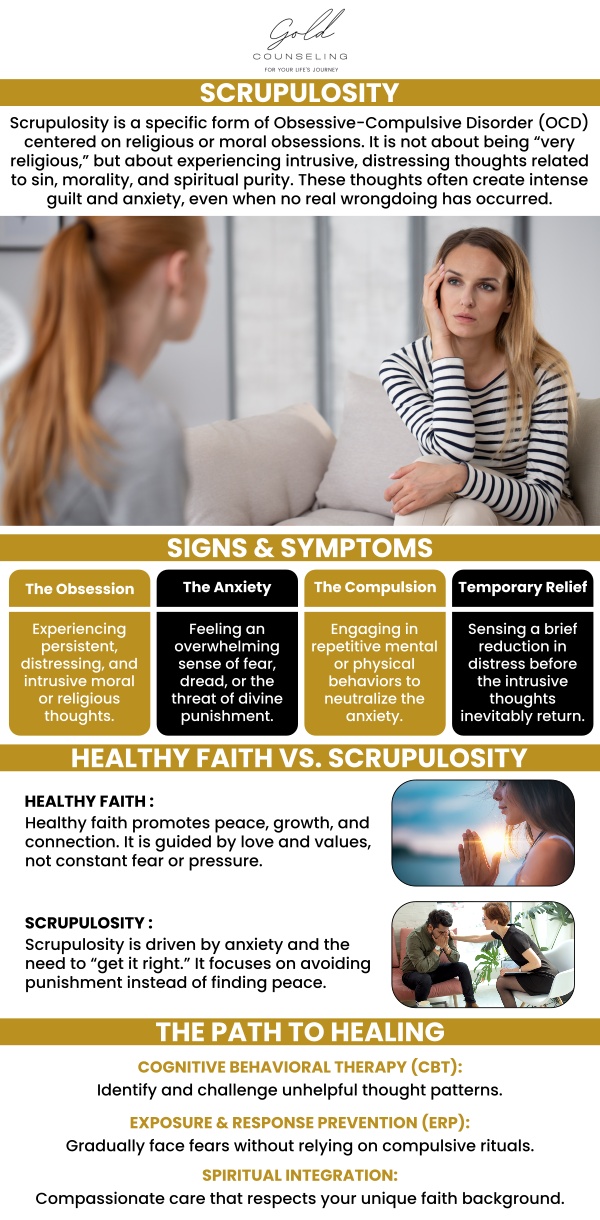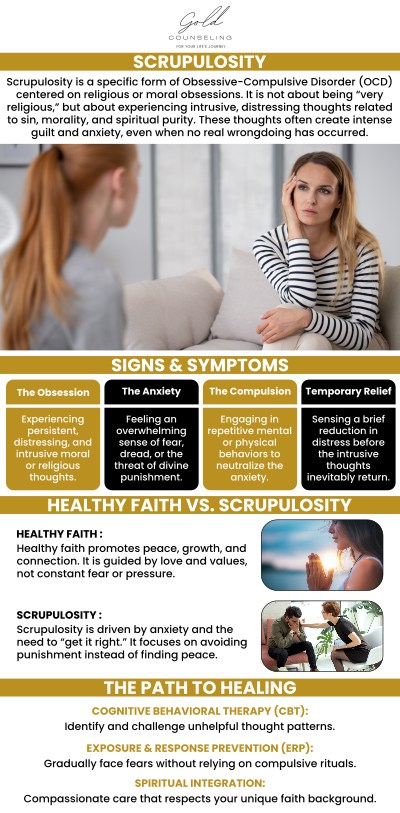Understanding Scrupulosity: Morals, Guilt, and Fear of Contamination
At Gold Counseling, we help individuals understand scrupulosity, a condition characterized by excessive moral concerns, guilt, and a fear of contamination. Often seen in those with obsessive-compulsive disorder (OCD), scrupulosity involves distressing thoughts about morality and purity, leading to compulsive behaviors aimed at preventing harm or maintaining moral cleanliness. For more information, contact us or book an appointment online. We have convenient locations to serve you in Riverdale UT, Kaysville UT, Draper UT, and St. George, UT.




Table of Contents:
What is scrupulosity?
How does scrupulosity affect a person’s morals and beliefs?
Why do people with scrupulosity often feel intense guilt?
Is scrupulosity related to contamination fears or OCD?
At Gold Counseling, we understand that your values, beliefs, and spiritual life are deeply important to you. Sometimes, however, concerns about moral or religious correctness can become so intense and persistent that they interfere with daily life—a condition known as scrupulosity.
Scrupulosity is a form of obsessive-compulsive disorder (OCD) where individuals experience intrusive, distressing thoughts about committing sins, being morally flawed, or violating religious rules, even when there’s little or no evidence for these fears. This often leads to repetitive behaviors such as excessive self-examination, frequent reassurance-seeking from clergy or loved ones, repeated confessions, or engaging in rituals meant to ease anxiety.
Left unaddressed, scrupulosity can cause significant distress, guilt, and confusion—and may even disrupt your spiritual or religious practices. We specialize in helping clients navigate these challenges with sensitivity and respect for your unique faith background. Our therapists are experienced in evidence-based treatments such as cognitive-behavioral therapy (CBT) and exposure and response prevention (ERP), which help you gradually face your fears and reduce compulsive behaviors. When appropriate, we also collaborate with medical providers regarding medication options, such as selective serotonin reuptake inhibitors (SSRIs).
We recognize that seeking help for scrupulosity can feel daunting, especially when your concerns are so closely tied to your core values. Our team is committed to providing compassionate, nonjudgmental support—helping you restore balance, reclaim your peace of mind, and reconnect with your spiritual life in a healthy, fulfilling way.
We recognize that scrupulosity—a form of obsessive-compulsive disorder centered on religious or moral fears—can deeply impact your well-being and spiritual life. Individuals struggling with scrupulosity often experience excessive anxiety about whether their thoughts or actions are morally or religiously acceptable. This can lead to persistent self-doubt, questioning the genuineness of their faith, or fearing that they are unintentionally committing moral or religious transgressions.
We understand how these concerns can make your relationship with your morals and beliefs feel strained or anxiety-driven, rather than comforting or uplifting. Many people with scrupulosity find themselves caught in distressing cycles of repetitive behaviors, such as excessive praying, confessing, or seeking reassurance, in hopes of alleviating their anxiety. Unfortunately, these rituals often overshadow the true meaning behind your values and can lead to a sense of isolation or disconnection from your faith or community.
Our compassionate therapists are experienced in helping individuals navigate the challenges of scrupulosity. Through evidence-based approaches, we support you in breaking free from the cycle of compulsions and self-doubt, so your morals and beliefs can once again serve as a source of guidance and fulfillment. Together, we work towards restoring a healthy, balanced relationship with your values—one that is rooted in personal growth and peace, rather than fear or distress.
Scrupulosity is a form of obsessive-compulsive disorder (OCD) characterized by persistent doubts and fears about moral or religious correctness. Individuals with scrupulosity often experience overwhelming guilt and anxiety, as their minds generate intrusive thoughts about potential wrongdoing—even when there is little or no evidence of having done something wrong. This leads to a constant questioning of one’s morality, spirituality, or personal values, and can make daily life challenging.
We understand the unique struggles faced by those dealing with scrupulosity. Our approach is rooted in evidence-based therapies and compassionate, individualized care. We recognize that guilt and self-doubt in scrupulosity are not easily resolved through logic or reassurance alone. Instead, our therapists work collaboratively with clients to break the cycle of obsessive thoughts and compulsive behaviors.
Through a combination of Cognitive Behavioral Therapy (CBT), Exposure and Response Prevention (ERP), and supportive counseling, Gold Counseling helps clients:
– Identify and challenge unhelpful thought patterns related to guilt and responsibility
– Develop healthier coping strategies for managing intrusive thoughts
– Reduce the need for reassurance-seeking and ritualistic behaviors
– Foster self-compassion and acceptance
At Gold Counseling, we recognize the unique struggles faced by individuals experiencing obsessive-compulsive disorder (OCD) in its various forms, including scrupulosity and contamination fears. Both conditions can significantly impact daily life, relationships, and spiritual well-being, but effective support and treatment are available.
Scrupulosity is a specific form of OCD that centers on religious or moral obsessions. Individuals may experience persistent, intrusive thoughts about committing sins, violating personal ethical codes, or offending a higher power. These distressing thoughts often lead to compulsive behaviors—such as excessive praying, seeking reassurance from faith leaders or loved ones, or performing ritualistic acts—to alleviate anxiety and guilt.
Another common manifestation of OCD involves obsessions about germs, illness, or feeling “tainted,” which can result in compulsive cleaning, washing, or avoidance behaviors. While the focus of contamination OCD is primarily on physical cleanliness or health, the distress and disruption it causes are just as real.
While scrupulosity and contamination fears are distinct in their focus, they can sometimes overlap. For instance, someone with scrupulosity may worry that being physically unclean is morally wrong or displeasing to their faith, causing religious and contamination-based obsessions to intertwine.
We understand that both scrupulosity and contamination fears are rooted in anxiety, intrusive thoughts, and compulsive behaviors—but the content of those thoughts can be deeply personal and sensitive. At Gold Counseling, we provide a compassionate, nonjudgmental environment where clients can explore these concerns openly.
Our experienced therapists offer evidence-based treatments, such as Cognitive Behavioral Therapy (CBT) and Exposure and Response Prevention (ERP), tailored to the unique needs of each individual. We also support clients in integrating their values, spirituality, or faith traditions into their recovery process—helping them find relief from OCD symptoms while honoring what matters most to them. For more information, contact us or book an appointment online. We have convenient locations to serve you in Riverdale UT, Kaysville UT, Draper UT, and St. George, UT. We serve patients from Riverdale UT, Washington Terrace UT, Clinton UT, Kaysville UT, Layton UT, Clearfield UT, Farmington UT, Draper UT, Riverton UT, Sandy UT, St. George UT, Washington City UT, Santa Clara UT, and surrounding areas.
Check Out Our 5 Star Reviews



Additional Services You May Need
▸ Relationship Counselling
▸ Couples Counselling
▸ Individual Therapy
▸ EMDR Therapy
▸ Spiritual Healing
▸ Disordered Eating
▸ LGBTQIA+ Therapy
▸ Group Psychotherapy
▸ Life Coaching Therapist
▸ Depression Treatment
▸ Mental Health Clinic
▸ Life Transition Therapy
▸ Telehealth Counseling
▸ Cognitive Behavioral Therapy (CBT)
▸ Dialectic Behavioral Therapy (DBT)


